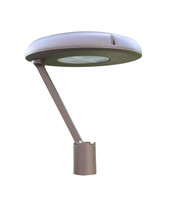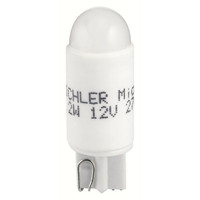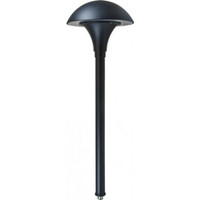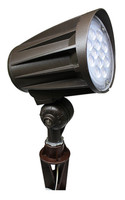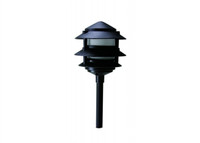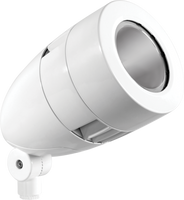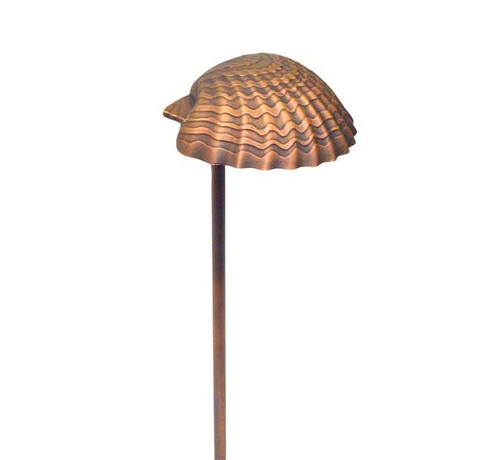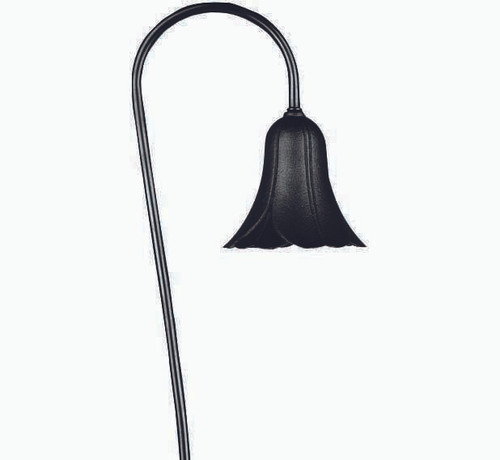
Landscape Lighting
Landscape Lighting
Landscape lighting or garden lighting refers to the use of outdoor illumination of private gardens and public landscapes; for the enhancement and purposes of safety, nighttime aesthetics, accessibility, security, recreation and sports, and social and event uses.
There are a lot of types landscape of lights and a lot of spaces to place them - it can easily be overwhelming with all the options out there, and it can be hard to find a place to start. One of the best things that you can do to scope out your own project it to grab a good, high-powered flashlight with a dimming optic and get out into your yard at night. Then, play with the light. See what looks cool, or what might not work as well.
20 Landscape Lighting Ideas and Applications
For a large number of homeowners, having a modern house that looks and feels beautiful is a major focus. So how do you brighten the outside of your home in such a way that your house looks amazing at night? Here are 20 landscape lighting ideas you'll dig and consider trying out:
- Driveway lighting: driveways can have the brick edge type of lighting with small glowing lights at the lower edges of the walls to illuminate the path as a car drives in.
- Walkway lighting: path lights, outdoor wall lights, floodlights, and downlights can be used to enhance the curb appeal of walkways and make evening walks safer.
- Deck and step lighting: Little lights fixed into the decks and steps that lead out into the yard help make it's easier to navigate your way through in the dark.
- Outdoor top post lighting:The taller posts stand in spaces that often get lost in the dark, while the shorter ones are placed on paths for accent
- In-ground lighting: often called well lights are usually hidden in the ground to promote the signature style of landscape lighting that includes the source of light not being seen while the focus is placed on the object being illuminated.
- Tree lighting: A string of bulbs in the tree foliage or around the tree trunk works wonders, or you could play around with having lights hanging down from the branches giving a kind of moonlight effect.
- Ponds and fountains: crossing beams of light will accentuate the ponds and fountains in any home, leaving no room for shadows.
- Pool sides and underwater lighting: Lights similar to unground lighting can be placed inside pools to give a certain mood to the pool, and string lights can be placed at the pool sides for effect.
- Backyard lighting: Down and uplighting are perfect for a clean structure show.
- Outdoor Entryway lighting: for inviting entryways, warm hanging lights to bathe the porch is a good fit, and it'll safely guide family and friends walking through.
- Garden walls: For garden walls, bullet or floodlights placed at the base of the walls gives a sharp contrast with the textures.
- Planting beds: Flower beds are best illuminated with lights placed a few feet apart in a way that guides the eyes from one plant to the other.
- Focal points: Spotlights, wash lights, bullet lights, etc. do a great job of pulling the eyes into areas that stand out, like pillars, tree swings, etc.
- Fence tops: Fence tops can be decorated with strings of lights similar to Christmas lights that glow in the dark.
- Walls and edges: Rocks with in-ground lights installed are a great fit for the base of walls, the edges can have a play of up and downlights for grazing effects.
- Overhang spaces and patios: For outdoor parties and dinner, a chandelier could be incorporated in overhang spaces to give an indoor feel on the outside.
- Sitting area lights: mini lamps can be hung or placed low in areas the family can sit around to enjoy the evening breeze.
- Lantern uses: The old-fashioned post top or outdoor wall lanterns can be placed in strategic locations around a yard to set a warm mood and keep a certain kind of glow around the house.
- Areas that don't stand out in the light: With areas that do not stand out during the day, spotlights can be used to set them apart in the dark.
- Sculpture enhancement: While sculptures are an attraction, night lights can be used to accentuate specific features of a sculpture, giving it a different feel at night than it has in the daytime.
What Landscape Lighting Can Do for Your Home
Everyone wants a bright and filled home with light; this increases the beauty of the home and makes you notice and appreciate the different colors surrounding the house. Your home is like your comfort zone; it is where you relax your nerves and body after the day's stressful work. Therefore it is important to ensure that the home is as comfortable as ever and all necessary things to ensure this is put in the right place.
Light brings out the beauty of the house, a lot of people today after a stressful day at work would like to relax in their garden, some might even decide to have a small picnic with friends and family, that is why it is very essential to ensure that the whole place is bright, shining and beautiful. When having those important dinner parties or family gatherings, you can decide to turn the outdoor light down or increase the level. It all depends on what you want.
Avoid Accidents in the Dark
A lot of accidents today happen when people don't get enough light to walk through a certain path in the home. Some of the injuries from this accident may be disastrous, while some may be mild. Nevertheless, it is very important to ensure that passageways, both indoor and outdoor, are lit up to prevent such occurrences. Also, well-lit pathways are very attractive and inviting; it makes the house look more beautiful to visitors, well- lit pathways make it easy for visitors to navigate their ways throughout the house without missing their steps which can lead to a domestic accident in the home.
Increase Your Home's Security
Let’s face it, bad things happen at night. For example, robbers take advantage of the dark to burgle different homes and unsuspecting individuals. These robbers take advantage of the dark because, by this time, they draw less attention to themselves. This is why you have to put up more lights outdoors this way, and you get to see any stranger that is approaching the house. This gives you the heads up so you can quickly call security operatives to the rescue. When you have enough lights and bulbs outdoor, it will be very easy for neighbors to spot any stranger that is approaching the house so you all can run for safety.
Elevate Home's Aesthetic
Landscaping lighting in the home does not apply to putting lights in the night, or when it's dark, this can also be done during the daytime as it also beautifies the house during the daytime. When putting up lights in the house, it is also essential to make sure you buy quality materials that will not fade off easily. You have to get durable and strong material that will last for a long time and not just something that will wear off easily. You can decide on the type of lighting you wish to put up, you can make use of warm light or a bright line depending on your preference, as long as the house is well-lit up and the home is beautiful.
Styling your Lawn's Landscape Lighting
The right outdoor lighting can boost home security, increase safety when walking around at night, and allow you to enjoy your outdoor spaces long after the sun sets. For the best landscape lighting, plan to incorporate a variety of fixtures and lighting types. Different exterior features, such as trees or shrubs, pathways, and architectural details, are best suited for certain outdoor light fixtures. Consider using a combination of spotlights, underground well lights, wide-angled floodlights, and pathway lighting to illuminate your home and landscaping at night. When choosing outdoor light fixtures, consider the power source and bulb type that best fits your lighting needs.
For long-lasting, energy-efficient landscape lights, first look for fixtures that use LED (light-emitting diode) bulbs, which are both long-lasting and consume less energy than CFL bulbs. Another option is solar landscape lights that use the sun's rays and a rechargeable battery for power, which makes for easy setup and eco-friendly energy use. However, note that these fixtures require direct sunlight during the day to recharge and don't offer as much illumination as wired landscape lighting. For increased brightness (or areas where the sun doesn't shine directly), low-voltage landscape lighting provides another energy-efficient option with DIY installation. This type of residential outdoor lighting connects to a transformer through wires, which can be buried underground or sit on top of the soil. Because of the low voltage (12 volts compared to your home's usual 120-volt system), these lights have a low risk of electrical shock and require less energy to run.
Types of Landscape Lighting
Now that you know what you want to light, how will you actually do it? There are a few basic types of fixtures that you want to get familiar with when you are making your lighting plan. Below are the various types of lighting you might find in a landscape:
Flood Lights & Spotlights
The difference between a spotlight and floodlight comes down to beam spread. Spotlights project a concentrated, narrow beam of light that's usually around 45 degrees. It's easier to aim and adjust so that if you're looking to highlight specific display points, like architectural details or landscape features, a spotlight will be your best choice.
Floodlights generally have a wider beam spread, up to 120 degrees. If you're looking to cast light over general areas like a driveway or lot, use a floodlight. It's better for overall safety and visibility.
In-Ground Lights
An in-ground light, or well light, is typically a circle-shaped fixture that installs directly into the ground, and is often used to illuminate walkways and driveways. In-grounds really heighten the sophistication and visibility of the features in your yard. It helps create drama and atmosphere with an uplight effect that illuminates the whole of a tree or structure. It also silhouettes the characters that stand around the yard; those you wouldn't be able to see on a typical night. They're best mixed with spotlights, if and when you can blend them, but uplighting on its own can be a strong lighting solution.
Since in-ground lights are hidden in the ground, the actual light effect is what stands out. In the case of an in-ground, make sure it's used to light up a strong presence on your yard. Don't worry about garden gnomes or short flowerbeds; concentrate on trees and garden walls.
Outdoor Post Lights
Post lights (and their robust cousins, bollard lights) help accent the pathway to your home and set an ambient tone without the overpowering brightness of floodlights. Tall posts are great for illuminating driveways and long stretches of space that get lost in the dark. Shorter posts work well for paths and small alcoves.
Path Lighting
Path lights are a basic outdoor fixture all yards should have. Similar to post lights in that they create light markers that run down a line, path lights are shorter and smaller in comparison. Path lights easily improve curb appeal and, of course, make walking along paths safer.
What are the different styles of pathway lights?
There are several varieties of fixtures effective for lining and lighting walkways. The most common types put to work on pathways are garden lights, downlights, bollard lights, and flush lights.
Garden Lights
Topped with a canopy that reflects light down onto adjacent paths and garden beds, garden lights typically stand between 18 and 24 inches tall.
Downlights
Directionally focused downlights affixed to a pole, wall, or adjacent tree offer effective pathway lighting. The spot design provides a targeted light source with little side glare. The farther away from a path, the larger the area of illumination.
Bollard Lights
Bollard (or pillar) lights have a 360-degree light spread and can illuminate garden beds and walkways simultaneously. Because they are a brighter light source, they are often placed at the start or end of a path as a focal point and to draw walkers in the right direction. Be careful of glare. Consider low-wattage bulbs or bollards with a solid top, to prevent the light from shining upwards.
Top-Rated Landscape Lighting Distributor & Supplier
Lightingandsupplies.com is a lighting distributor of Indoor & Outdoor Commercial and Residential light fixtures and bulbs. Based in the US, we carry the top LED lighting brands like EiKO, RAB Lighting, MaxLite, naturaLED, Westgate Lighting and more. We also carry a wide variety of Horticulture products by Hydrofarm, along with ceiling fans by RP Lighting+Fans. Lightingandsupplies.com also provides rebate programs, expert lighting design advice, and lighting audits for large projects. As a wholesale ad bulk distributor of lighting products, we take pride in our customer-focused 100% satisfaction guarantee and return policy.
For more information, call 888-325-4448 or email: info@lightingandsupplies.com for more information.

